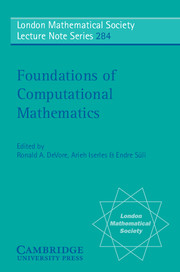Book contents
- Frontmatter
- Contents
- Preface
- Singularities and computation of minimizers for variational problems
- Adaptive finite element methods for flow problems
- Newton's method and some complexity aspects of the zero-finding problem
- Kronecker's smart, little black boxes
- Numerical analysis in Lie groups
- Feasibility control in nonlinear optimization
- Six lectures on the geometric integration of ODEs
- When are integration and discrepancy tractable?
- Moving frames — in geometry, algebra, computer vision, and numerical analysis
- Harmonic map flows and image processing
- Statistics from computations
- Simulation of stochastic processes and applications
- Real-time numerical solution to Duncan-Mortensen-Zakai equation
Statistics from computations
Published online by Cambridge University Press: 05 August 2013
- Frontmatter
- Contents
- Preface
- Singularities and computation of minimizers for variational problems
- Adaptive finite element methods for flow problems
- Newton's method and some complexity aspects of the zero-finding problem
- Kronecker's smart, little black boxes
- Numerical analysis in Lie groups
- Feasibility control in nonlinear optimization
- Six lectures on the geometric integration of ODEs
- When are integration and discrepancy tractable?
- Moving frames — in geometry, algebra, computer vision, and numerical analysis
- Harmonic map flows and image processing
- Statistics from computations
- Simulation of stochastic processes and applications
- Real-time numerical solution to Duncan-Mortensen-Zakai equation
Summary
Abstract
The study of numerical methods for initial value problems by considering their approximation properties from a dynamical systems viewpoint is now a well-established field; a substantial body of knowledge, developed over the past two decades, can be found in the literature. Nonetheless many open questions remain concerning the meaning of long-time simulations performed by approximating dynamical systems. In recent years various attempts to analyse the statistical content of these long-time simulations have emerged, and the purpose of this article is to review some of that work. The subject area is far from complete; nonetheless a certain unity can be seen in what has been achieved to date and it is therefore of value to give an overview of the field.
Some mathematical background concerning the propagation of probability measures by discrete and continuous time dynamical systems or Markov chains will be given. In particular the Frobenius-Perron and Fokker-Planck operators will be described. Using the notion of ergodicity two different approaches, direct and indirect, will be outlined. The majority of the review is concerned with indirect methods, where the initial value problem is simulated from a single initial condition and the statistical content of this trajectory studied. Three classes of problems will be studied: deterministic problems in fixed finite dimension, stochastic problems in fixed finite dimension, and deterministic problems with random data in dimension n → ∞; in the latter case ideas from statistical mechanics can be exploited to analyse or interpret numerical schemes.
Information
- Type
- Chapter
- Information
- Foundations of Computational Mathematics , pp. 323 - 344Publisher: Cambridge University PressPrint publication year: 2001
Accessibility standard: Unknown
Why this information is here
This section outlines the accessibility features of this content - including support for screen readers, full keyboard navigation and high-contrast display options. This may not be relevant for you.Accessibility Information
- 2
- Cited by
